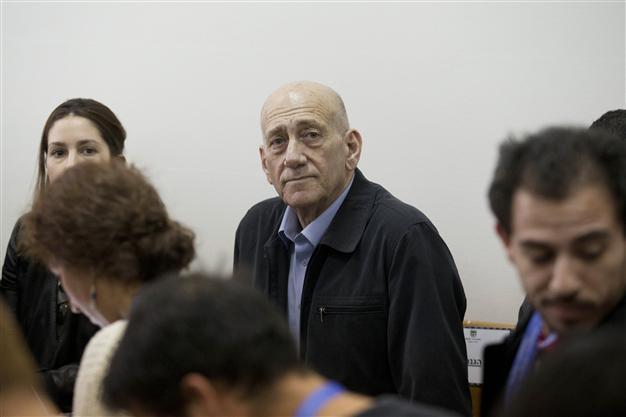Ex-Israel PM Olmert found guilty in corruption retrial
JERUSALEM - Agence France-Presse

Former Israeli Prime Minister Ehud Olmert, center, waits for a verdict in Jerusalem's District Court on Monday, March 30, 2015. AP Photo
A Jerusalem court found former Israeli premier Ehud Olmert guilty of corruption March 30 in a retrial of allegations he received envelopes of cash from a US businessman, the verdict read.It was the latest legal blow in a humiliating fall from grace for the debonair man who took over as prime minister in 2006 after his mentor and predecessor Ariel Sharon lapsed into a coma from which he never recovered.
"We find the defendant guilty of fraud and a breach of trust," the Jerusalem district court verdict read, "and of the felony of fraud under aggravated circumstances."
Sentencing for the 69-year-old, who already faces a six-year prison sentence in a separate bribery case that he has appealed to the supreme court, is scheduled to begin on May 5, the verdict stated.
Olmert has always insisted on his innocence, describing the allegations against him as "a brutal, ruthless witch-hunt", and his lawyers said he would appeal the latest conviction.
He had initially been acquitted of fraud and corruption in the case, escaping in 2012 with a $19,000 fine and a suspended jail sentence for breach of trust.
But new evidence came to light during his trial in the other corruption case, and prosecutors again pressed the charges.
In return for a reduction in sentence, his former secretary and confidante Shula Zaken brought to the court secret recordings of conversations she had with Olmert.
Olmert is heard talking about the tens of thousands of dollars that he received from businessman Morris Talansky while trade and industry minister in the early 2000s.
The six-year prison sentence handed down against Olmert in May last year was the first ever against a former Israeli premier for corruption.
After a two-year trial, he was convicted of taking bribes to the tune of 560,000 shekels (now $140,000/129,000 euros) while mayor of Jerusalem between 1993 and 2003 from the developers of the city's massive Holyland residential complex.
The towering construction project, which dominates the city's skyline, is seen as a major blot on the landscape and widely reviled as a symbol of high-level corruption.
Olmert resigned as premier in September 2008 after police recommended that he be indicted for graft, but he remained in office until March 2009, when the current prime minister, Benjamin Netanyahu, was sworn in.
Before taking over as premier in 2006, Olmert was recognised as a key strategist behind many of Sharon's boldest moves, including Israel's 2005 withdrawal from the Gaza Strip and his decision to leave the rightwing Likud and form the centrist Kadima party.
After Sharon's collapse, Olmert led Kadima to victory in March 2006 on a platform of dismantling dozens of settlements and withdrawing troops from most of the West Bank.
But from that point, things began to go downhill, with his West Bank plan shelved after a 34-day war against Lebanon's Hezbollah that summer that killed more than 1,200 in Lebanon, mostly civilians, and 160 in Israel, mostly soldiers.
Unlike many of his predecessors, Olmert lacked an illustrious military background and his handling of the crisis was harshly criticised.
Although he rejected peace talks for decades, Olmert underwent a late-career conversion, playing a key role in Israel's 2005 pullout from Gaza and later reviving negotiations with the Palestinians.
Following the relaunch of peace talks in November 2007 after a seven-year hiatus, Olmert met several times with Palestinian president Mahmud Abbas, offering far-reaching concessions in a bid to reach an agreement.
In her memoirs, published in 2011, former US secretary of state Condoleezza Rice wrote of her surprise at a secret May 2008 proposal by Olmert to withdraw from 94 percent of the occupied West Bank with land swaps for the rest and Jerusalem as shared capital for Israel and Palestine.
But the talks were abruptly halted in December 2008 when Israel embarked upon a devastating three-week offensive in Gaza.
















